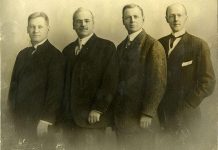
Long ago, when I was a small boy and the world seemed a different place, I used to listen to a science-fiction programme on the radio, The Adventures of Dan Dare, Pilot of the Future. The programme came from Radio Luxembourg and was first broadcast in July 1951, the same year the station transferred from the long wave to its legendary home of 208 metres. Few people knew that the fifteen-minute episodes of Dan Dare were actually recorded on wax discs, only two of which have survived.
The origins of Radio Luxembourg (“Your station of the stars”) date back to the 1920s and the country’s central position, bordered by Belgium, Germany and France; Luxembourg made it ideal for international broadcasting. When the station started beaming English language programmes to the UK and Ireland in 1933, it had the most powerful privately-owned transmitter in the world.
During the 1950s and 1960s Radio Luxembourg’s commercial American-style presentation became hugely popular in Britain, especially with the younger generation and its lively shows were in stark contrast to the somewhat austere radio programmes otherwise available. Listeners were encouraged to believe that everything was live from Luxembourg and while some of the disk-jockey shows were indeed live from the Grand Duchy, many programmes were actually pre-recorded in a dismal-looking building in Hertford Street, Central London.
In case you’d forgotten, 23rd June is Luxembourg’s National Day. Although the country has been somewhat overshadowed culturally by its larger neighbours, music has always been important in Luxembourg especially after the establishment of the Grand Duchy in 1815. In more recent times, the Luxembourg Philharmonic Orchestra and the Luxembourg Sinfonietta have become a lively part of the classical music scene.
David Ianni (b. 1979): Obsculta. David Ianni (pno) (Duration: 06:33; Video 720p HD)
David Ianni is an acclaimed pianist from Luxembourg and has composed more than a hundred works, including compositions for piano and choral music. He has also composed chamber music, an oratorio and music for piano and orchestra. He gave his international concert debut at the age of sixteen, performing Franz Liszt’s Second Piano Concerto with the Luxembourg Philharmonic Orchestra.
Obsculta (“Listen”) is a thoughtful work for solo piano, reflecting on the nature of silence and inspired by a text from St. Benedict. This 2012 video of David Ianni’s performance is a visual essay by the Luxembourg filmmaker who goes by the name of Vitùc. It was made at the Austrian Abbey of Heiligenkreuz in the southern part of the Vienna woods, and this impressive twelfth century Cistercian monastery provides a handsome back-drop to the video.
Vitùc has created a remarkable piece of work which not only records David Ianni’s performance but also reveals interesting perspectives on silence and time. The music contains a quotation of the Gregorian chant Ubi Caritas in which the sound of softly chanting monks is skillfully blended into the video and synchronized with the piano solo. The music itself is very approachable and reflects the composer’s personal musical style which is inseparably linked to the mysteries of the Catholic faith.
Johann Sebastian Bach (1685-1750): Partita No 1 in B flat major, BWV 825. Francesco Tristano (pno) (Duration: 16:09; Video: 1080p HD)
Also from Luxembourg, Francesco Tristano is another acclaimed classical pianist and composer who was born in 1981. As a young man, he studied at conservatories in Luxembourg, Brussels, Riga and Paris before graduating in music at New York’s Juilliard School. He made his professional debut in 2000 with the Russian National Orchestra playing Prokofiev’s Fifth Piano Concerto. Tristano is a specialist in both Baroque and contemporary music. In 2001, he founded The New Bach Players ensemble with which he recorded J. S. Bach’s complete cycle of keyboard concertos. In contrast, he’s also recorded the complete piano works of the Italian twentieth century composer, Luciano Berio.
By the time Bach’s Six Partitas were published between 1726 and 1730, the composer was established as a virtuoso keyboard player. There is no exact translation for the word “partita” and Bach used it merely as a synonym for “dance suite”. The suites evidently caused quite a sensation among Bach’s contemporaries, for in the opinion of the German music historian Johann Nikolaus Forkel, “such splendid keyboard compositions had never previously been seen or heard”.
Each partita contains six or seven dance movements and needless to say, they’re exceptionally demanding technically. Francesco Tristano gives a compelling performance full of verve and sprightly rhythmic playing. The melodic lines are crystal clear, the articulation is clear and sparkling, especially in the gloriously rippling Allemande (at 02:10) and the Corrente. There’s lovely phrasing in the stately Sarabande and the concluding Gigue takes us on a hair-raising ride with beautifully controlled dynamics and brilliant articulation. The clarity of line reminds me slightly of Glenn Gould’s playing style, yet to my mind this performance seems to have a good deal more magic and sensitivity.
 |
 |
 |





